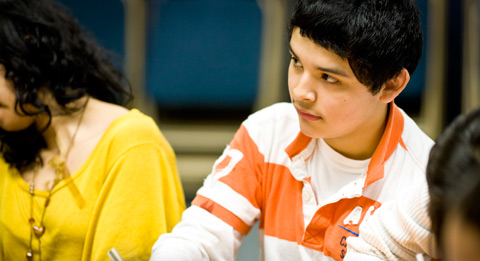
Prophets and apostles teach that education is an eternal principle, following the Savior’s counsel that “the glory of God is intelligence, or, in other words, light and truth” (D&C 93:36) and that “whatever principle of intelligence we attain unto in this life, it will rise with us in the resurrection” (D&C 130:18).
“For members of the Church, education is not merely a good idea—it’s a commandment,” says President Dieter F. Uchtdorf, Second Counselor in the First Presidency. Members of the Church are instructed to learn “of things both in heaven and in the earth, and under the earth; things which have been, things which are, things which must shortly come to pass; things which are at home, things which are abroad” (D&C 88:79).
Desks of Their Own!

Reflecting on his youth in postwar Germany, when opportunities for education were scarce, President Uchtdorf recalls, “One day, while I was out on my bike delivering laundry, I entered the home of a classmate of mine. In one of the rooms, two small desks were nestled against the wall. What a wonderful sight that was! How fortunate those children were to have desks of their own! I could imagine them sitting with open books studying their lessons and doing their homework. It seemed to me that having a desk of my own would be the most wonderful thing in the world.
“I had to wait a long time before that wish was fulfilled. Years later, I got a job at a research institution that had a large library. I remember spending much of my free time in that library. There I could finally sit at a desk—by myself—and drink in the information and knowledge that books provide. How I loved to read and learn!”
“Joseph Smith loved learning even though he had few opportunities for formal education. In his journals, he spoke happily of days spent in study and often expressed his love of learning. The Prophet Joseph taught, ‘Knowledge does away with darkness, [anxiety], and doubt; for these cannot exist where knowledge is.’”
Strive to Increase Your Knowledge
President Uchtdorf continues, “Strive to increase your knowledge of all that is ‘virtuous, lovely, or of good report or praiseworthy.’ Seek knowledge ‘by study and also by faith.’ [See Articles of Faith 1:13; D&C 88:118; 109:7; 109:14).
“In our learning, let us not neglect the fountain of revelation. The scriptures and the words of modern-day apostles and prophets are the sources of wisdom, divine knowledge, and personal revelation to help us find answers to all the challenges in life. Let us learn of Christ; let us seek out that knowledge which leads to peace and truth.”
Choosing Your Life’s Work

President Thomas S. Monson advises youth all over the world to study and prepare for their life’s work in a field they enjoy, because they will be spending a good part of their lives in their chosen field.
“[Your chosen field] should be one which will challenge your intellect and which will make maximum utilization of your talents and your capabilities. Finally, it should be a field that will supply sufficient remuneration to provide adequately for your companion and your children. Now that’s a big order. But I bear testimony that these criteria are very important in choosing your life’s work.”
President Monson notes that this counsel is also relevant for young women, as life presents situations that are not predictable and may require employable skills.
Education Should Be Challenging
President Monson also counsels that education should challenge us to grow. “I hope that you are not afraid of tough classes,” he says. “I never did have a ‘cinch’ class. … You simply have to apply yourself. I hope that you want to be so well equipped that you can compete in this competitive world. I hope that you will learn to take responsibility for your decisions, whether they be in your courses of study which you elect to take, or whether they be in the direction of the academic attainments which you strive to achieve.”
“You have access to the lighthouse of the Lord. There is no fog so dense, no night so dark, no mariner so lost, no gale so strong as to render useless the lighthouse of the Lord. It beckons through the storms of life. It seems to call to you and me: ‘This way to safety; this way to home.’”
“My young brothers and sisters, don’t take counsel of your fears. Don’t say to yourselves, ‘I’m not wise enough, or I can’t apply myself sufficiently well to study this difficult subject or in this difficult field, so I shall choose the easier way.’ I plead with you to tax your talent, and our Heavenly Father will make you equal to those decisions.”
“In this life, where we have opportunities to strive and to achieve, I bear witness that on occasion we need to make a second effort—and a third effort, and a fourth effort, and as many degrees of effort as may be required to accomplish what we strive to achieve.”
A Religious Responsibility

Elder Russell M. Nelson of the Quorum of the Twelve Apostles says, “Your mind is precious! It is sacred. Therefore, the education of one’s mind is also sacred. Indeed, education is a religious responsibility. Of course, our opportunities and abilities will vary a great deal. But, in the pursuit of one’s education, individual desire is more important than is the institution you choose; personal drive is more significant than is the faculty.”
“Our Creator expects His children everywhere to gain an education as a personal endeavor. … When you leave this frail existence, your material possessions will remain here, but the Lord has declared that the knowledge you acquire here will rise with you in the resurrection. … In light of this celestial perspective, if you impulsively drop out or otherwise cut short your education, you would not only disregard a divine decree but also abbreviate your own eternal potential.”
“When I was serving both as a medical doctor and a stake president, I chatted with many young people about their personal educational pursuits. Some asked me how long it took to become a doctor of medicine. I replied, ‘The general pattern would be four years at a university, followed by four years in medical school. And, should you choose to specialize, that could add another five years or more.’”
“My words would often evoke a response like, ‘You mean … ? Why, that adds up to 13 years—and maybe more? That’s too long for me!’
“‘That all depends,’ I would respond. ‘Preparation for your career is not too long if you know what you want to do with your life. How old will you be 13 years from now if you don’t pursue your education? Just as old, whether or not you become what you want to be!’
“So my counsel then—and now—is to continue your education, wherever you are, whatever your interest and opportunity may be. Determine how you can best serve your family and society and prepare well.”
